Get your Heather Lewis fix:
- Your Veterinary Voice episode 4: Meet Heather Lewis, AIA, NCARB.
- Cost estimating will save headaches later on.
- Freaked out pets? Try outdoor examinations.
Where nothing says sexy like durability and cost-effectiveness.
The process of building or remodeling a veterinary clinic demands that you focus your attention on aspects hospital you may have previously given little thought to or taken for granted. Like flooring and wall materials. If this seems like a less than scintillating topic, take it from HospitalDesign360 conference speaker Heather Lewis, AIA, NCARB, of Animal Arts in Boulder, Colorado, when she stresses its importance:
"Almost every veterinary professional has been scarred and traumatized by a flooring failure or some other spectacular material catastrophe," she says.
With that potential horror in mind, Lewis has outlined the top 10 high-performance surface choices for veterinary hospitals.
Large format porcelain tile in action. Photo courtesy Animal Arts.
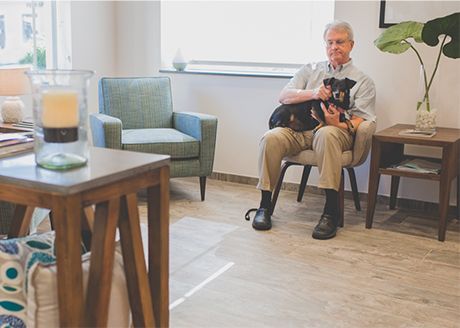
Lewis admits that this is not new, having been around since the Han Dynasty (you remember those guys, right?), but has undergone some upgrades. Nowadays this tile is available in a choice of styles and with slip-resistant textures.
This flooring takes over where epoxy left off, except that according to Lewis, they don't react poorly to thermal shock. Or get yellow over time. Or crack. Move over, epoxy-urethane resin is where it's at.
Luxury vinyl tile. Photo courtesy Animal Arts.
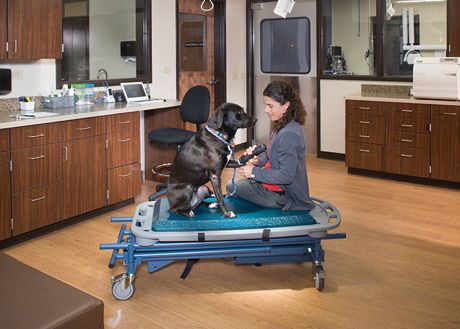
This surface has a number of things going for it. Let's get this right out there: It's relatively inexpensive. Add to that the fact that it's good looking, and has very small joints, and you've got an excellent product.
"This flooring is a wonderful newer product that has been tried enough to have a track record in veterinary medicine," Lewis says. "It's sanitary enough to use in all client areas, and could be used occasionally in treatment spaces."
This is a non-slip flooring that originated in the field of human medicine. These surfaces have a veritable laundry list of factors to recommend them, including:
Non-wax vinyl. Photo courtesy Animal Arts.
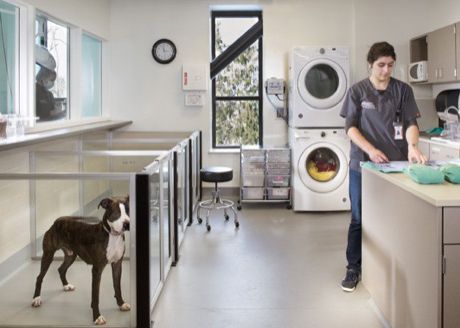
While earlier varieties of this product came in both colors (cream and beige), the newer models are available in eye-catching choices. Plus, some sorts of the vinyl have an acoustic rating.
"This trend is very exciting, as we can potentially get sound performance from a floor as well as a ceiling," Lewis says.
One-part epoxy paint. Photo courtesy Animal Arts.
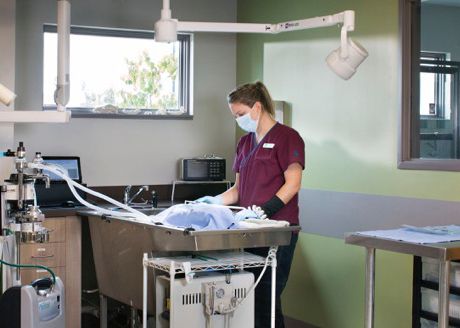
One-part epoxy paint. Photo courtesy Animal Arts.
Lewis says they've put these one-part epoxy paints through the paces at the Animal Arts offices. She is happy to report that they've stood up to Clorox and Rescue cleaners as well as they type of scuffs that would come with a runaway cart. They haven't gone so far as to urinate on the paint, unfortunately.
Get a load of this stuff: It doesn't sag, shed, get moldy or absorb water. You can use it in a standard grid, and it "can absorb up to 90 percent of reverberant noise with tested frequency ranges." For these reasons Lewis calls it their new favorite ceiling material.
Acoustical wall panels mounted high in boarding. Photo courtesy Animal Arts.
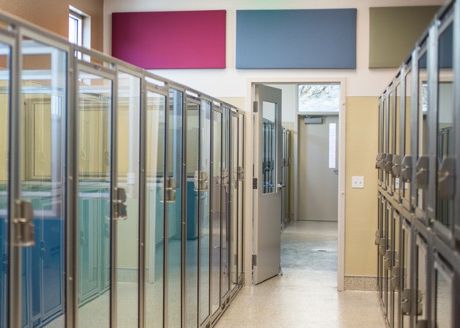
These have come a long way as well. The current crop of fabrics are imminently more cleanable and are available with special images, like landscapes. Much better than the ugly, bulky panels of days past.
Long-lasting and chemical resistant, these doors are a bit pricier, but when put in the right spot are worth it. Installed in dog kennel, they never rot or degrade. What's more, they don't need to be painted-ever. Lewis also notes that these are a hit as exterior doors in coastal regions where they'll last a long time.
Hexagonal wall tiles in a mix of colors. Photo courtesy Animal Arts.
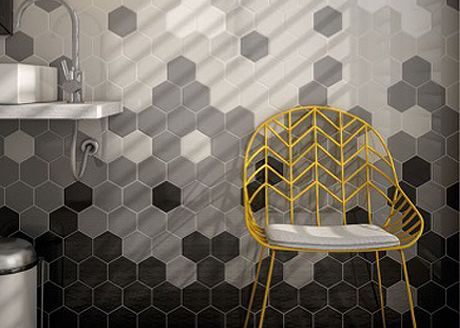
Yes, those are shapes, not products. "We like hexagons because they hide minor imperfections, as they are naturally busier than squares or rectangles," says Lewis.
Consider the products that are available in a six-sided fashion: floor and wall tiles in a variety of sizes, acoustical wall panels, and even light fixtures if you want to give a trendy look to your ceilings.
So, get the jump on what we know are problems that plague veterinary practices and, as Lewis puts it, “Cautiously explore the boundaries of products to find newer solutions.”